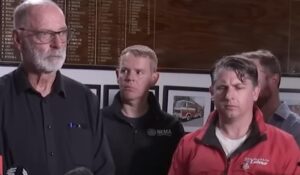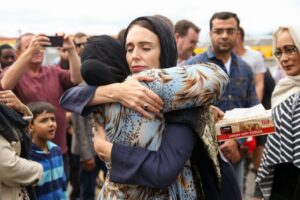Auckland mayor Wayne Brown has come under scrutiny of late regarding his response to the massive flooding in Auckland in late January. You would be hard pressed to find a New Zealander who believes that Brown has put Auckland’s best foot forward in reaction and response to the weather event.
While many may disagree with Ardern’s response to various intricacies of the disasters that she faced during her leadership, there is one thing that she shares with Brown: they were both voted in. Is there not a better reminder of the power that our vote holds than when someone who wins a seat with such a clear majority falls short of expectations at the beginning of their term?

Hannah Watkinson shares her thoughts as an Ōtautahi based young woman passionate about leadership and democracy. She stood for Heathcote Community Board in the 2022 LG elections Follow her political page on Facebook
Under the Local Government Act the role of the Mayor is:
1. to provide leadership to
(a) the other members of the territorial authority; and
(b) the people in the district of the territorial authority.
2. Without limiting subsection (1), it is the role of a mayor to lead the development of the territorial authority’s plans (including the long-term plan and the annual plan), policies, and budgets for consideration by the members of the territorial authority.
3. For the purposes of subsections (1) and (2), a mayor has the following powers:
(a) to appoint the deputy mayor
(b) to establish committees of the territorial authority:
(c) to appoint the chairs of the committees
Christchurch City Councillor Sara Templeton, in the lead up to the 2022 local government elections, presented an excellent series on the various roles of elected officials in local government.
Sara went further to comment
“in practice the role is a lot more than that and ‘providing leadership’ includes working with other Mayors across the region and country, representing the city to Government and declaring civil defence emergencies.
It includes hosting citizenship ceremonies as well as speaking at many community events and conferences. Diplomacy is involved too and welcoming delegations from other nations, showcasing the city and always putting our best foot forward.”
Auckland Mayor Wayne Brown

Auckland mayor Wayne Brown has come under scrutiny of late regarding his response to the massive flooding in Auckland in late January. You would be hard pressed to find a New Zealander who believes that Brown has put Auckland’s best foot forward in reaction and response to the weather event.
Brown, under the affiliation of ‘Fix Auckland’, won the 2022 election with 45% of the vote – with his next closest rival, Labour and Greens endorsed Efeso Collins, securing just 31% – 57,000 votes apart. With at least that number of people severely affected by the flooding – homes, businesses and livelihoods – that gap in support may have shrunk. Brown’s highest polling suburbs include Wairoa, Orakei and Dairy Flat, while his lowest polling suburbs were Otara and Mangere. The highest polling suburbs were hit hard by unprecedented levels of rain, and those from the suburbs that offered him the least support during the elections have been interviewed and quoted as feeling “forgotten” already. All of this will make for interesting polling results in future.
So what does Wayne think his job is? He’s more vocal about what he thinks it’s not.
- His job is not about being ‘brave’ – in regards to being any earlier than the Civil Defence duty controller to suggest declaring a state of emergency
- He is not required to talk to media – he’s agreed to two of 108 requests since starting the role
- It’s not the mayor’s role to rush out with buckets during a one in 200-year flooding event
- He does not need to be accountable for his work hours
- He will not be desk bound
- He should not encourage diversity of opinions and communication in elected representatives
Jacinda Ardern’s leadership
We can take obvious examples of a different kind of leadership from our ex-PM Jacinda Ardern – demonstrated through the Christchurch Mosque Attacks, the Whakaari White Island Disaster, and Covid-19.
When asked to describe the most important quality that has underpinned her path, Ardern said (unsurprisingly) :

“Kindness, and not being afraid to be kind, or to focus on, or be really driven by empathy. I think one of the sad things that I’ve seen in political leadership is – because we’ve placed over time so much emphasis on notions of assertiveness and strength – that we probably have assumed that it means you can’t have those other qualities of kindness and empathy.
And yet, when you think about all the big challenges that we face in the world, that’s probably the quality we need the most. We need our leaders to be able to empathise with the circumstances of others; to empathise with the next generation that we’re making decisions on behalf of. And if we focus only on being seen to be the strongest, most powerful person in the room, then I think we lose what we’re meant to be here for. So I’m proudly focused on empathy, because you can be both empathetic and strong.”
In tangible terms, our highest profile elected representative achieved a number of the things that are critical in defining good leadership:
- impeccable communication (I remember Instagram live streams at 10pm in her sweaters and trackpants during Covid lockdowns, to answer questions and provide reassurance to the general public rather than just media press conferences)
- an understanding or at the very least an attempt at empathy for those experiencing hardship, accountability and
- an effort to not pass blame, and the intelligence and foresight to know when to lean on those with more knowledge and when to assert her level of authority.
While many may disagree with Ardern’s response to various intricacies of the disasters that she faced during her leadership, there is one thing that she shares with Brown: they were both voted in. Is there not a better reminder of the power that our vote holds than when someone who wins a seat with such a clear majority falls short of expectations at the beginning of their term?
Similarly to Ardern, while mixed emotions are held about Bob Parker’s time as Mayor of Christchurch during the 2010/11 earthquakes, he fronted the national news channels every evening for weeks – ensuring consistent and concise information was shared in a communication style that made those affected and those watching feel that he had, at least, his feet on the ground.
Buck-passing, defensiveness, and finally concessions
Brown’s cavalier attitude and off-the-cuff remarks don’t cut it when the Super City is in crisis mode. Perhaps he’s getting what he wished for – an Auckland truly in need of fixing. As Tim Murphy said, “Brown came to power vowing to rid the city of orange road cones, symbols of diversion and delay. Right now, and for some time yet, cones will be everywhere he goes, fluoro reminders of a weekend he’d rather forget.”
Leave a Reply